BİA MEDIA MONITOR OCTOBER-NOVEMBER-DECEMBER 2022
Is the clampdown on the media to win the elections?
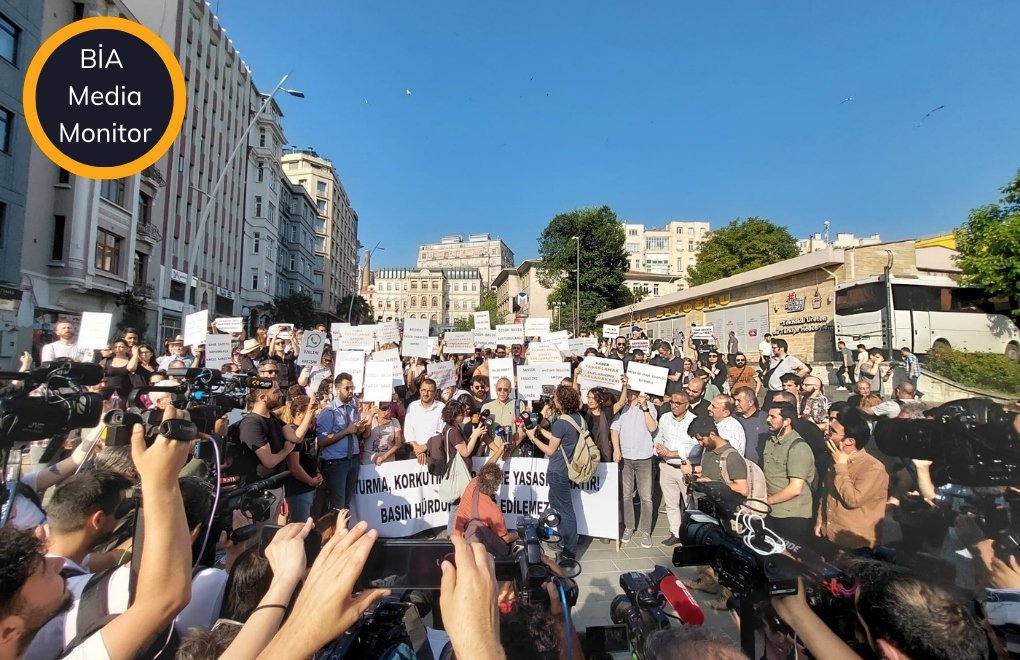
Infographic: Yağmur Karagöz
Click to read the article in Turkish / Kurdish
Ekim, Kasım, Aralık döneminde dokuz Kürt medyası çalışanı tutuklandı, 11 gazeteci gözaltına alındı. 171 gazeteci hakim karşısına çıktı. Gazetecilere yapılan sekiz saldırının dördü polisten geldi. 257 online haber sansüre uğradı. 10 Ocak Çalışan Gazeteciler Günü, kutlu olsun.
Journalists and media outlets who want to exercise their right to investigation and criticism are preparing for elections in deep anxiety, especially because of the discriminatory decisions of the Radio and Television Supreme Council (RTÜK) and criminal cases involving powerful people.
Months into the elections, the judiciary arrested journalists en masse upon the messages of the ruling power and kept them in prison for months without and indictment.
171 journalists stood trial; 12 acquitted, 14 sentenced
The BİA Media Monitoring Report shows in October, November and December, at least 171 journalists and media representatives were put on trial on charges related to the Turkish Penal Code, the Anti-Terror Law and the Law on Gatherings and Demonstrations, and nine were asked to pay material and immaterial damages. Also, the prolonged appeal and Court of Cassation proceedings for 32 journalists reveal the gravity of working below the Sword of Democles.
In the last three months of 2022, 12 journalists were acquitted of "insulting the president," "insult," "provoking the public into hatred and hostility," "propagandizing for a terrorist organization," and "praising a crime." However, 14 others were sentenced to a total of 21 years, 3 months and 22 days in prison and to pay a 8,720 lira fine for "insulting the president," "insulting a public official," "propagandizing for a terrorist organization," and "aiding an illegal organization."
"Erdoğan" convicts: 73 journalists in eight years, two in three months
In the same period, 16 cartoonists were involved in cases for "insulting the president." The prosecutions against Levent Gültekin and Mustafa Sönmez were new, whereas courts sentenced Sabahattin Önkibar and Mehmet Emin Kurnaz to 11 months and 20 days in prison. Velat Öztekin, a former reporter for the Azadiya Welat newspaper, on the other hand, was acquitted of this charge. While Ümit Zileli was detained on the suspicion of "insulting the president," the appeals court overturned journalist Hakkı Boltan's prison sentence "against" him.
Unfortunately, local courts in Türkiye continue trials regarding article 299 of the Turkish Penal Code despite a Venice Commission recommendation for the revocation of the article of "insulting the president" and the ECtHR's 2021 decision on Vedat Şorli. Since Erdoğan was elected the president in August 2014, more than 200 journalists have stood trial for "insulting the president," with 73 of them sentenced to prison or pay a fine.
25 Kurdish media employees arrested in six months
After the arrest of 16 Kurdish media employees during a Diyarbakır-based operation on June 16, nine more journalists were detained in an investigation carried out by the Ankara Chief Public Prosecutor's Office. The appeal against the arrests was not examined because "the prosecutor was on the leave." Türkiye has been included in the category of "countries that arrested the largest number of journalists" for the first time since the coup attempt.
Erdoğan, TÜGVA, SADAT and İnal seek compensation
In the last three months, Sedef Kabaş, Mehmet Kızmaz, and Cumhuriyet and Evrensel newspapers were sentenced to pay a fine of 75,000 lira in total for "violating the personal rights" of President Erdoğan, TÜGVA, SADAT, and Kastamonu University Rector Ahmet Hamdi Topal.
Apart from these cases, eight journalists, three news portals and three newspapers faced to pay a fine of 945,101 lira in total. The court rejected 300,000 lira of this in cases filed by Mustafa Doğan İnal, former lawyer of President Erdoğan.
One YouTuber, 11 journalists detained
In the last three months, at least 11 journalists and media representatives were detained. Also, the owner of the "Sade Vatandaş" [Ordinary Citizen] YouTube channel, Mehmet Koyuncu, was detained during a vox-pop interview in the Gebze district of Kocaeli.
Four of the detentions were made during the protests held in several provinces on the 24th anniversary of Kurdistan Workers' Party (PKK) leader Abdullah Öcalan. During the "Justice Watch" in Kadıköy, İstanbul, Zeki Kaya, a camera operator for Artı TV, was detained after filming the police slapping and detaining HDP İstanbul Co-Chair Ferhat Encü. He was released after the videos were deleted from his camera.
Ümit Zileli, a columnist for the Korkusuz newspaper was detained for "insulting the president" and Fatih Yaşlı, a columnist for the soL news portal, was detained for "degrading state institutions." Başaran Düzgün, editor-in-chief of the Northern Cyprus-bases Havadis newspaper, was not allowed to enter Türkiye because it was found "objectionable." In the same period last year, 14 journalists were detained.
Eight attacks, four of them from the police
In the last three months, at least eight journalists and media representatives, including two local journalists, were the target of attacks. Also, at least three journalists were threatened. Four of the attacks came from the police, which cannot stand seeing journalists on the streets, and three (TELE1, Zeybek TV etc.) came from citizens who have the same mentality. Journalist and writer Timur Soykan received threats after bringing a case of child abuse in a religious community to the national agenda.
Constitutional Court is the hope for everyone
While no Constitutional Court decision regarding journalists' rights or media freedom was made public in the last three months, the high court continued to attract journalists seeking justice through individual applications. The arrest of 16 Kurdish media employees in Diyarbakır and the drop of the Musa Anter murder case 30 years after the incident due to the statute of limitations were taken to the Constitutional Court. Another application came from Hacı Boğatekin, an executive of the Adıyaman Gerger Fırat newspaper, who was not retried despite a Constitutional Court verdict about his conviction to pay compensation.
As a matter of fact, Constitutional Court President Zühtü Arslan said during an event in Venice, "The Constitutional Court simply says this: My power is not enough to make up for every violation in the country." The Constitutional Court stated that it would discuss the CHP's application for the annulment of article 29, which was added to the Turkish Penal Code defining the "disinformation" offense. In this period, the ECtHR did not give a verdict regarding media freedom, either.
Gains against impunity
A persistent and notable struggle is going on against impunity regarding media representatives being targeted by the police during demonstrations (Gökhan Biçici, Beyza Kural, Bülent Kılıç etc.) or by fanatic groups during election periods (Yavuz Selim Demirağ). In this period, a court issued a monetary fine on three security branch officers who had rear-handcuffed Beyza Kural, a former bianet reporter, while telling her "Nothing will be the same," while she was following a demonstration about the Higher Education Council (YÖK) in İstanbul. However, the Constitutional Court had found that she had been subjected to "humiliating treatment."
The decision of non-prosecution regarding the AFP photojournalist Bülent Kılıç's beating and detention on June 27 during the Pride Parade was reversed. Another good news was that Berkant Gültekin joined the legal struggle against the Presidency Communication Directorate's "Press Card" discrimination. Previously, many journalists, including IPS Communication Foundation Chair and bianet Project Adviser NAdire Mater, Aydın Engin after his passing away, journalist-economist Mustafa Sönmez, Yeni Asya newspaper editor-in-chief Kazım Güleçyüz, Evrensel newspaper Ankara representative Birkan Bulut had won the struggle for a press card.
However, the "routine" procedures observed in cases like the Uğur Mumcu murder case, which has hurt the public conscience for decades, deeply undermine confidence in the pursuit of justice. The will expected from the ruling power to find the truth diminishes as the political nature of the cases increase.
257 online news articles censored
In the October-December period, Penal Judgeships of Peace and the Union of Access Providers, blocked access to at least 257 online news and journalism articles bringing up allegations of corruption, bribery and favoritism (Barış Pehlivan, Murat Ağırel, Barış Terkoğlu). The reason for "personal rights" were common in the access blocks.
72 dismissals in three months
In the October-December period, at least 72 journalists, columnists, or media representatives were either dismissed or had to resign due to disputed arising from outlets' editorial lines. Hürriyet newspaper dismissed 62 employees after the Journalists' Union of Turkey (TGS) registered that it had the quorum to operate at the newspaper. Arif Kızılyalın, a sports columnist who has been the editor-in-chief of the daily Cumhuriyet for over the past year, was also dismissed.
This number was 58 in the same month last year when there were crises within the management of Cumhuriyet, Gazete Duvar, Halk TV and Haber Global.
RTÜK continued fines
The Radio and Television Supreme Council issued five monetary penalties and three broadcast suspension penalties on TV outlets because of their news and programs in October-November-December 2022. It issued two administrative monetary fines on radio outlets. The council fined TV outlets a total of 371,240 lira, and radios 52,127 lira. It issued a three-day broadcast suspension on TELE1. (EÖ/NÖ/VK)
BİA MEDIA MONITORING REPORT 2024
The government made journalists' lives a living hell in 2024
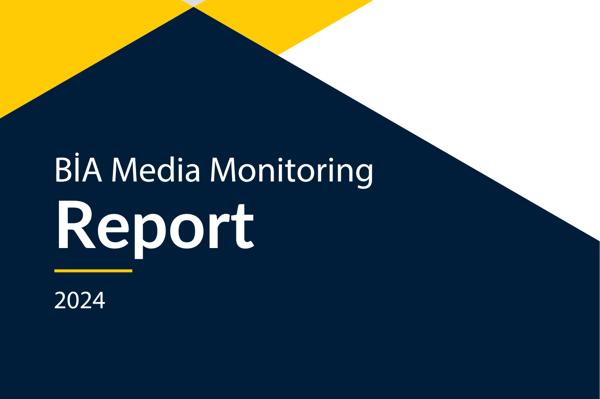
BİA MEDIA MONITORING/OCTOBER-NOVEMBER-DECEMBER 2024
Truth concealed through repression from all sides targeting journalists
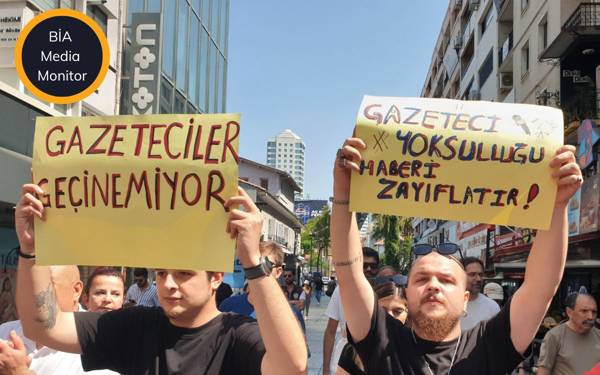
BİA MEDIA MONITORING REPORT
Just silence the journalist, and I won't touch you!
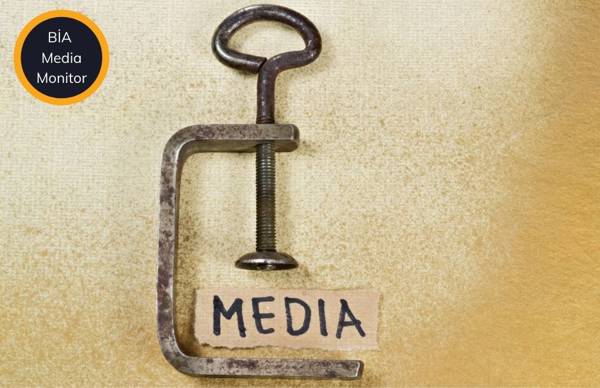
BİA MEDIA MONITORING APRIL-MAY-JUNE 2024
Journalists are on the target and have no legal security anymore!
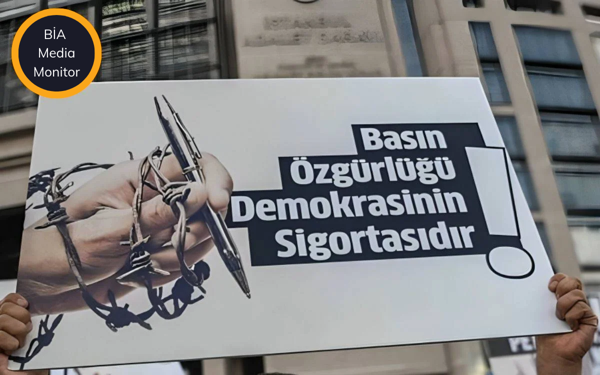
BİA MEDIA MONITORING REPORT
The era of 'judicial control' confinement and torture in journalism
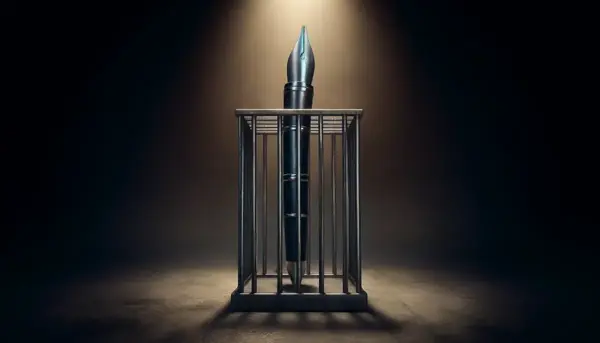





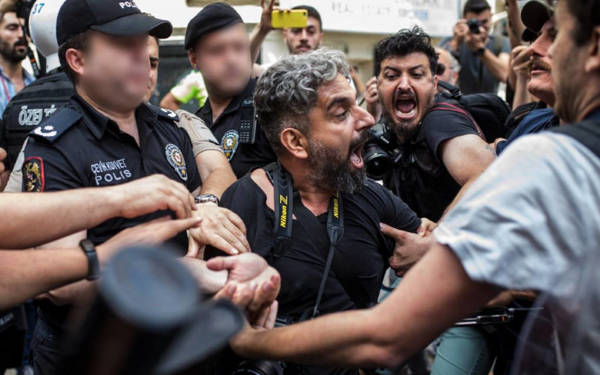
.jpg)